A look at the 4-2 scoreline may give the appearance that Real Salt Lake shredded Portland's defense in an wide-open free-for-all. On the contrary, two of RSL's goals came directly from corner kicks, while a third was courtesy of the generosity and stone touch of Futty Danso (who was also marking Schuler on RSL's first goal). Credit should of course go to Salt Lake for piling on the pressure, but what really characterized Real Salt Lake's play on Sunday was not a free-flowing attack, but rather excellent team defense and a commitment to attacking via the flanks.
No Space for Portland
Throughout the match, Real Salt Lake's defensive shape remained resolute, and never came close to being broken down by Portland's 4-3-3. Kyle Beckerman was, as ever, the linchpin of RSL's midfield, leading the team in aerial duels won with 6 (of 7) and tackles (4, tied with Tony Beltran), and contributing 6 clearances. However, the incessant pressure of Sebastian Velazquez and Luis Gil—who it should be noted are 19 and 22 years old, respectively—along with the fullback pairing of Beltran (who led RSL in touches with 76) and Chris Wingert/Lovel Palmer, never allowed any space for Diego Valeri or Darlington Nagbe to work their magic in the midfield. Many of Portland's forays into the penalty area stemmed from Rodney Wallace collecting the ball in wide positions and sending in listless crosses (0-for-6) that were easily dealt with by Nat Borchers. Forward Ryan Johnson was kept in check all game, limited to a mere 18 touches in his 59 minutes on the field.
The entirety of Portland's productive offensive output consisted of Will Johnson's free kick goal, Piquionne's soaring headed goal, and a 77th minute shot from Alhassan after a slick dribbling spell through the heart of RSL's midfield. For the entire game, Portland had only two successful dribbles and three successful crosses in the attacking third (one of which was Jewsbury's beautiful assist).
Defending from the Front
The only change in the starting lineup for Real Salt Lake to start the game was Devon Sandoval replacing an ailing Alvaro Saborio. While few would argue that Sandoval is the better player, his kinetic style, defensive workrate, and ability to get into wide spaces provided problems for the Great Wall of Gambia.
Chalkboards of Devon Sandoval vs. Portland (left) and Alvaro Saborio vs. Los Angeles (right)
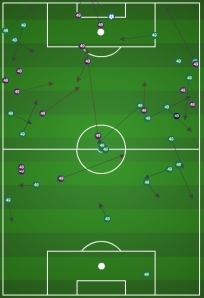
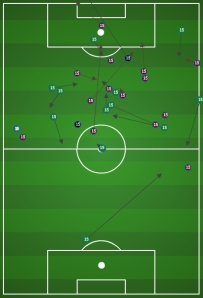
As you can see, the defense starts from the front. Sandoval pressured wide all game long, trying to disrupt Portland's rhythm in the defensive half of the field. Of Sandoval's 43 actions against Portland, only 11 (25.6%) took place in the center third of the field, compared to 15 of 28 (53.6%) for Saborio against Los Angeles. Sandoval also pressured back more than Saborio did: 8 of 43 (18.6%) actions by Sandoval took place in RSL's half of the field, compared to a meager 2 of 28 for Saborio (7.1%).
Stretching the Diamond
What really stuck out about the way that Real Salt Lake played, however, was the way that their midfield “diamond” stretched from touchline-to-touchline, with Velazquez manning the left, Gil hugging the right, and Morales drifting from side-to-side, looking for an inch of space wherever he could find it.
Here is a chalkboard of passes attempted by Real Salt Lake, along with the percentage of passes attempted from each section of the field:
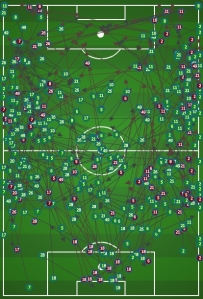
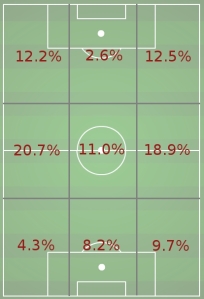
And here are all of the passes attempted by Portland, along with the percentage breakdown:
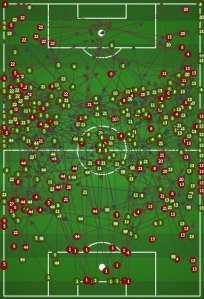
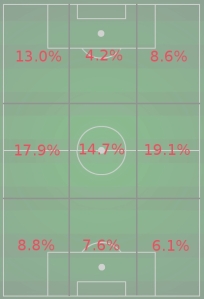
Real Salt Lake attempted only 13.6% of their passes from the central attacking portions of the field, while 64.3% of their passes came from the wide attacking areas. Portland, by contrast, attempted 18.9% of their passes from the central areas, and 58.6% of their passes coming from the wide attacking zones.
RSL ratio of wide-attacking passes to central-attacking passes: 4.73-to-1
POR ratio of wide-attacking passes to central-attacking passes: 3.10-to-1
Real Salt Lake took their chances against Portland's flank defense rather than try to fight through Will Johnson and Diego Chara. The gambit worked well, as all eight of RSL's key passes and assists came from wide positions.
Three questions for leg 2 in Portland:
1. Will Saborio be healthy? If so, Sandoval will likely see the bench again as Findley's speed will serve as an outlet against a high-pressing, possibly desperate Timbers squad, unless...
2. Kreis opts for the 4-2-3-1? Beckerman and Yordany Alvarez were deployed in a double pivot at Los Angeles a few weeks ago, and while the results were not exactly convincing, it perhaps implies (or at least I'm inferring) that Kreis may want to take a more conservative approach on the road in the playoffs.
3. Ryan Johnson or Frederic Piquionne? Ryan Johnson has put in a workmanlike effort thus far in the playoffs, but with his playing time diminishing each game (83 min @ SEA, 69 min v SEA, 59 min @ RSL) and Piquionne finally healthy (and able to leap clear over Nat Borchers), it may be time for Piquionne to crack the starting lineup.








